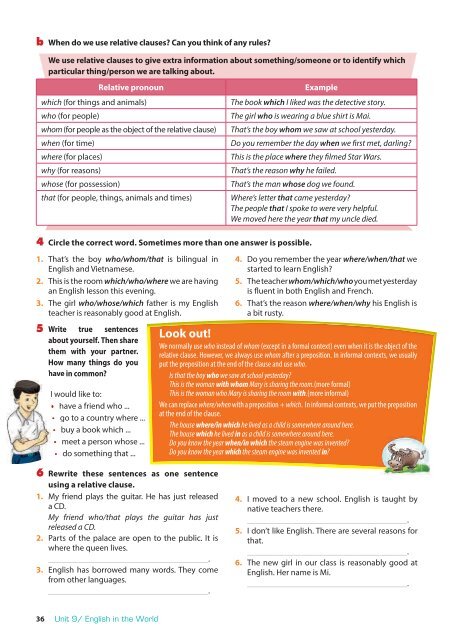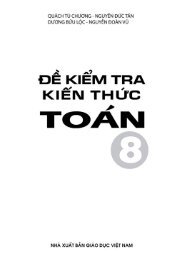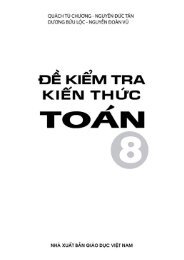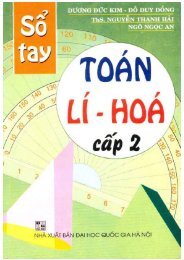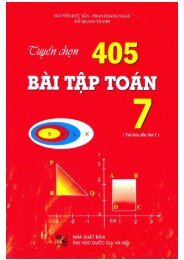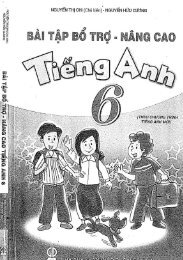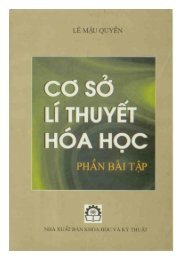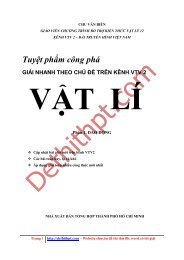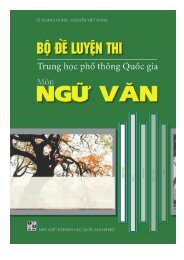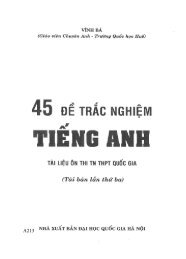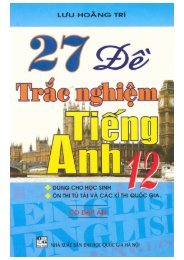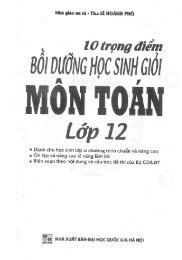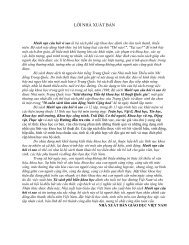Sách giáo viên Tiếng Anh 9 Thí điểm 2 tập (Pilot English 9 for Teacher)
https://app.box.com/s/rnv2yu1duebjhdpkknu2l47p9nmel5ax
https://app.box.com/s/rnv2yu1duebjhdpkknu2l47p9nmel5ax
You also want an ePaper? Increase the reach of your titles
YUMPU automatically turns print PDFs into web optimized ePapers that Google loves.
When do we use relative clauses? Can you think of any rules?<br />
We use relative clauses to give extra in<strong>for</strong>mation about something/someone or to identify which<br />
particular thing/person we are talking about.<br />
Relative pronoun<br />
which (<strong>for</strong> things and animals)<br />
who (<strong>for</strong> people)<br />
whom (<strong>for</strong> people as the object of the relative clause)<br />
when (<strong>for</strong> time)<br />
where (<strong>for</strong> places)<br />
why (<strong>for</strong> reasons)<br />
whose (<strong>for</strong> possession)<br />
that (<strong>for</strong> people, things, animals and times)<br />
Example<br />
The book which I liked was the detective story.<br />
The girl who is wearing a blue shirt is Mai.<br />
That’s the boy whom we saw at school yesterday.<br />
Do you remember the day when we first met, darling?<br />
This is the place where they filmed Star Wars.<br />
That’s the reason why he failed.<br />
That’s the man whose dog we found.<br />
Where’s letter that came yesterday?<br />
The people that I spoke to were very helpful.<br />
We moved here the year that my uncle died.<br />
4 Circle the correct word. Sometimes more than one answer is possible.<br />
1. That’s the boy who/whom/that is bilingual in<br />
<strong>English</strong> and Vietnamese.<br />
2. This is the room which/who/where we are having<br />
an <strong>English</strong> lesson this evening.<br />
3. The girl who/whose/which father is my <strong>English</strong><br />
teacher is reasonably good at <strong>English</strong>.<br />
5 Write true sentences<br />
about yourself. Then share<br />
them with your partner.<br />
How many things do you<br />
have in common?<br />
I would like to:<br />
have a friend who ...<br />
go to a country where ...<br />
buy a book which ...<br />
meet a person whose ...<br />
do something that ...<br />
4. Do you remember the year where/when/that we<br />
started to learn <strong>English</strong>?<br />
5. The teacher whom/which/who you met yesterday<br />
is fluent in both <strong>English</strong> and French.<br />
6. That’s the reason where/when/why his <strong>English</strong> is<br />
a bit rusty.<br />
Look out!<br />
We normally use who instead of whom (except in a <strong>for</strong>mal context) even when it is the object of the<br />
relative clause. However, we always use whom after a preposition. In in<strong>for</strong>mal contexts, we usually<br />
put the preposition at the end of the clause and use who.<br />
Is that the boy who we saw at school yesterday?<br />
This is the woman with whom Mary is sharing the room.(more <strong>for</strong>mal)<br />
This is the woman who Mary is sharing the room with.(more in<strong>for</strong>mal)<br />
We can replace where/when with a preposition + which. In in<strong>for</strong>mal contexts, we put the preposition<br />
at the end of the clause.<br />
The house where/in which he lived as a child is somewhere around here.<br />
The house which he lived in as a child is somewhere around here.<br />
Do you know the year when/in which the steam engine was invented?<br />
Do you know the year which the steam engine was invented in?<br />
6 Rewrite these sentences as one sentence<br />
using a relative clause.<br />
1. My friend plays the guitar. He has just released<br />
a CD.<br />
My friend who/that plays the guitar has just<br />
released a CD.<br />
2. Parts of the palace are open to the public. It is<br />
where the queen lives.<br />
____________________________________________.<br />
3. <strong>English</strong> has borrowed many words. They come<br />
from other languages.<br />
____________________________________________.<br />
4. I moved to a new school. <strong>English</strong> is taught by<br />
native teachers there.<br />
____________________________________________.<br />
5. I don’t like <strong>English</strong>. There are several reasons <strong>for</strong><br />
that.<br />
____________________________________________.<br />
6. The new girl in our class is reasonably good at<br />
<strong>English</strong>. Her name is Mi.<br />
____________________________________________.<br />
36 Unit 9/ <strong>English</strong> in the World


